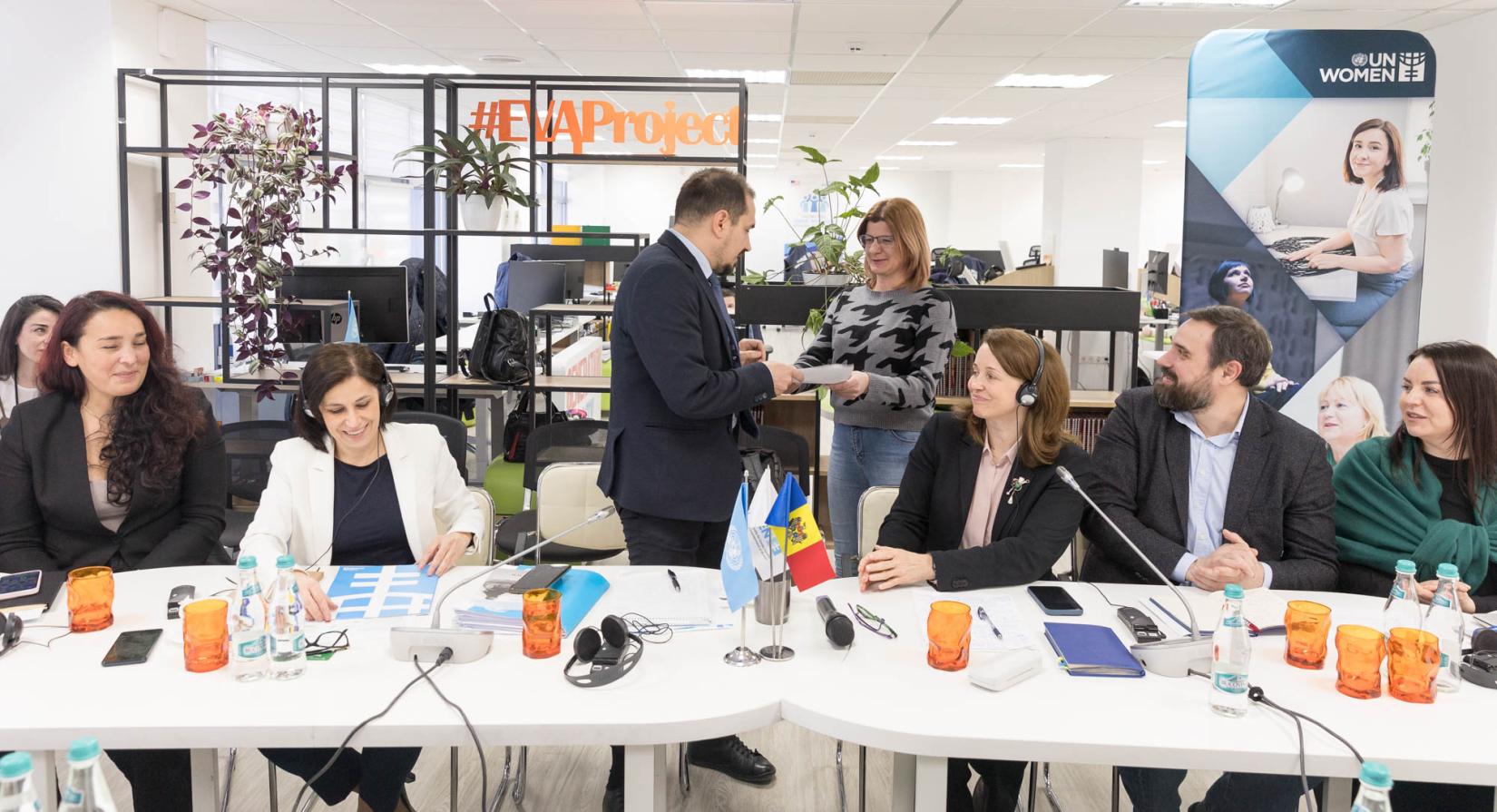Women and girls with disabilities present a manifesto calling for inclusion
22 February 2023
A manifesto created by women and girls with disabilities was submitted to the government as part of the project "Addressing stigmatization, discrimination and violence for the empowerment of women with disabilities in the Republic of Moldova," which is being implemented by UNDP Moldova and UN Women Moldova. The project aims to address key challenges in overcoming stigma and discrimination, with the aim of better addressing violence against women and girls with disabilities through the integration of cross-sectoral elements.

After the manifesto was presented, the event featured a dialogue with the Minister of Labour and Social Protection of the Republic of Moldova, Alexei Buzu; UNDP Moldova’s Interim Resident Representative Andréa Cuzyova; UN Women Moldova’s Country Representative, Dominica Stojanoska; and, of course, women and girls with disabilities, who are beneficiaries of the global project.
The purpose of the event was to present the manifesto, which addresses the barriers these women and girls face, and to organize a discussion to identify solutions and ways to address these problems and the phenomenon of stigma and discrimination itself.
In the Republic of Moldova, people with disabilities face multiple challenges in exercising their rights, and they also encounter difficulties in accessing essential services and livelihoods. Moreover, women and girls with disabilities face double discrimination, exposing them to a higher risk of facing gender-based violence, sexual abuse, neglect, ill treatment and exploitation. Women and girls with disabilities encounter several forms of violence: domestic violence and violence within the community, public and private institutions and educational institutions, which often hinder their access necessary services.
Among the requests put forward in the declaration was the demand to create a group for women with disabilities who know the problems facing people with disabilities in their regions and can get involved in decision-making. The group would work toward improving access to infrastructure and transport, organizing professional training courses, promoting information on rights and ensuring the economic and political empowerment of women with disabilities in their communities.
Attending the dialogue, Alexei Buzu, the Minister of Labour and Social Protection of the Republic of Moldova, said that the key to addressing the challenges faced by people with disabilities is ensuring their inclusion and respecting their human rights. He stressed the need to increase the participation of people with disabilities in the ministry’s programmes and other relevant institutions. “I encourage you to get involved in consultation processes,” he told the audience. “To ensure progress, it is necessary to identify a way to continue this dialogue through technical discussions on concrete topics. I admire your courage. You are a source of inspiration”.
During the event, Dominika Stojanoska, UN Women Moldova’s Country Representative, stressed the importance of the manifesto in eliminating barriers faced by women with disabilities. "I am glad that we are carrying out this joint project, which addresses issues related to the inclusion of people with disabilities, as well as the elimination of gender-based violence and the promotion of the role of women in society,” she said. “It is very important for us to work alongside women and be solution-holders for them”. Addressing the project’s beneficiaries, she explained that the main goal of having discussions with them last year was to identify the challenges and barriers they face. “I am glad that you have followed up on the idea of formulating a manifesto with your solutions to these problems, because you know and understand these aspects best,” she said. “I believe that most of the proposals put forward in the manifesto can be implemented. Some will require more time. Others, less. I am convinced that thanks to this project and the clear actions proposed, we will be able to move things forward. Let's keep this dialogue active".
Andrea Cuzyova, UNDP Moldova’s Interim Resident Representative, said she was impressed by the manifesto. “This is yet another call to unite our efforts and actions to strengthen women's rights and end violence and discrimination against women and girls,” she said. “When obstacles to inclusion are eradicated and women with disabilities are empowered to participate fully in social life, communities can thrive”.
During the dialogue, women with disabilities talked about the stigma and discrimination they face, which are shaped by various barriers, prejudices and stereotypes in society. With emotion in her voice, Boghiu Diana, a signatory of the manifesto, said: "No one has ever accepted me as I am. I moved to the city with the hope of being heard and because I wanted a better future".
On that same note, Tatiana Bunescu, a person with an acquired locomotor disability and a signatory of the manifesto, stressed that the manifesto seeks to make the voices of all women and girls with disabilities heard. "What we want is for the government and public authorities to no longer ignore us because we exist, we are part of society, we want to be integrated”. She explained that women with disabilities need professional opportunities, which would allow them to make a living and gain self-esteem. “With this declaration, we speak on behalf of all women and girls with disabilities, including those from villages and districts – isolated somewhere, marred by depression and ignorance".
Elena Crîșmari, a local councillor in Dolna village, Strășeni district, addressed a number of problems faced by people with disabilities and expressed hope that after signing the declaration, women and girls with disabilities will be given increased attention: "I hope that the Social Assistance Directorate will be centralised and that the focus will be on people with disabilities and not on documentation".
During a dialogue with the Minister of Labour and Social Protection, women and girls present at the event were encouraged to continue being active in promoting rights and creating opportunities for people with disabilities. Emma Matreniuc, a UN Women Moldova consultant for the project expressed her gratitude for organising the dialogue: "We thank you for this opportunity; this meeting is a very strong challenge for women and girls with disabilities because this path is hard, but we have high hopes."
Lilia Puzderi, a local councillor in Borogani, in Leova district, expressed her gratitude as well: "I am glad that there is an openness to the fact that we, women with special needs, have a role in society”.
Written by Moldovan women and girls with disabilities, the manifesto reiterates their needs, provides a range of solutions to the challenges they face and calls for eliminating stigma and discrimination to create a more inclusive society.

Laura Bohantova




